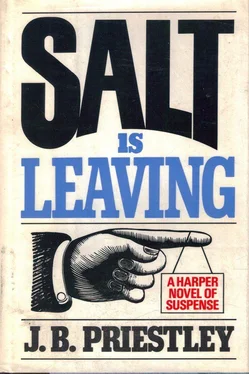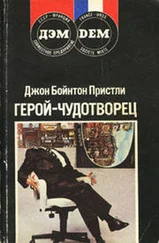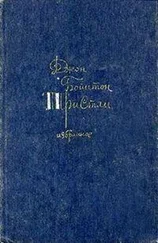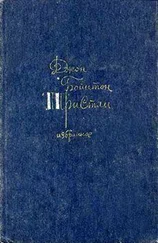"I know this. She went off to Birmingham – she has friends there and then there's my sister – to get away from this trouble she mentions. I don't say she was right – she ought to have waited and then asked me what she ought to do – but it all begins to make sense."
"Well, it doesn't to me. Who's Noreen, and where does she come into it?"
"You don't know?"
"Oh – really!" Maggie could have slapped her. "Of course I don't know."
"Well, your father does, doesn't he? Peggy wrote that letter to him. She says she told him something about Noreen. It's there in the letter, isn't it?"
"Yes, it is, Mrs Pearson." Maggie was making a great effort to control herself. "But, you see, I'm looking for my father. And if your daughter's gone away, then I'll talk to this Noreen."
"You can"t. She's been missing for the last three weeks."
"Oh – no!" It was a cry of dismay, not a contradiction. "Are you sure?"
"Well, she had a room here. She walked out one night and never came back. Dr Salt knows all about it. He was Noreen's doctor. Ours as well."
"Then I'll go and see Dr Salt." Maggie got up, glad to be going. "And if somebody tells me he " s missing, I'll start screaming. Do you know where I can find him?"
"No, I don"t. I used to see him at the surgery, but he's finished down there. He's leaving Birkden." Clearly Mrs Pearson enjoyed making these announcements.
Maggie muttered something about finding him in the telephone book, then hurried out, hoping she had done with Mrs Pearson for ever.
3
The man who opened the door was smallish but rather bulky and was probably about forty-five. He was wearing an old corduroy jacket over a dark blue sports shirt. He had that fine dusty sort of hair, but darker and bristling eyebrows. Behind him a gramophone was making a tremendous sound, so that she had to shout and felt foolish. "Good afternoon. Are you Dr Salt?"
He nodded. "No longer in practice, though."
"I don't want to consult you as a doctor," she shouted. "It's about Peggy Pearson and somebody called Noreen."
He nodded again, and then, instead of replying, he opened the door properly and waved her in. As soon as he had closed the door behind her, he hurried past her to turn off the gramophone.
"Scherzo of the Bruckner Seventh Symphony – Klemperer and the Philharmonia," he said solemnly. "But do sit down. This isn't a bad chair." He removed a pile of books from it. "There you are. I'm about to move on and I'm trying to decide which books and records to keep. Tricky business. Going to take me longer than I thought." He removed two record cases from a large armchair, sat down, and began lighting a pipe. "Now then. What about Peggy Pearson and Noreen? Or, first, what about you?"
"I'm Maggie Culworth. I don't live here but in Hemton-"
"Bookshop – High Street?"
"Oh – you know it. I'm so glad. Yes, that's my father's shop, and I work there."
"Been in a few times. Downstairs chiefly – secondhand department. Talked to your father – and I seem to remember a comfortable middle-aged woman-"
"Yes, Mrs Chapman." Maggie was still feeling glad. After the Lyceum and Mrs Pearson, this seemed so sensible and cosy. "Probably you've never seen me because I'm often working in the little office at the back. But, anyhow, you've met my father, and it's because of him I'm here, Dr Salt." She explained carefully what her father had done on Monday, and then went on: "As you've met him, perhaps you can understand why we"re so mystified and worried. He's always so cautious, so conscientious, so reliable-"
"He would be – yes," said Dr Salt. "Not the kind of man to go off and leave you all worrying about him."
"That's just it. Well, then this letter came for him this morning. And as you"re mentioned in it, I don't see why you shouldn't read it." He seemed to take in the letter almost at a glance; he was obviously an exceptionally quick reader. Then he looked at her, nodded and handed back the letter. "I ought to tell you," she said hurriedly, "that I tried to find Peggy Pearson at the Lyceum cinema, but she wasn't there. Then I went to see her mother, who told me that Peggy rushed off to Birmingham last night-"
"Away from the trouble she mentions in the letter?"
"That's what her mother seems to think. But she's a muddled sort of woman, and she wasn't in last night and so didn't hear what Peggy had to say. Dr Salt, does any of this make any sense to you?"
"Yes," he replied cheerfully. "Most of it."
"Thank goodness! Can you tell me?"
"Certainly. But I can't tell you how your father comes to be involved. So we'll leave that for the moment. I saw Peggy Pearson yesterday afternoon at the Lyceum to ask her some questions about a friend of hers, Noreen Wilks, who used to be one of my patients. Peggy believed that Noreen had gone to the South of France with her boy friend. I told her I didn't believe this. On the morning of September 12th I signed her application form for a passport. That evening she went out at the usual time and never came back. Now just after I had left Peggy, I think she was threatened by an unpleasant young man, who afterwards paid me a visit here. I also think she ran into the office a few yards away, and there she hastily wrote that letter to your father. He probably saw her on Monday afternoon, and she told him she thought Noreen had gone abroad."
"And now she's telling him that you didn't think so," said Maggie hastily, if only to prove she wasn't a complete fool.
"And something else equally important. Read the second sentence."
" And now there is trouble so look out but I am in a hurry to write this so cant explain ." Maggie looked at him. "The unpleasant young man?"
"I think so. You realize, of course, Miss Culworth, that Noreen Wilks is the central figure here-"
"She isn't to me," Maggie told him bluntly. "I don't care about Noreen Wilks, only about my father. That's natural, isn't it?"
"Certainly. But it may not be good enough." He gave her a sharp, bright look. It was rather startling, because most of the time he looked so lazy and sleepy. An odd man. She couldn't decide if she liked him or disliked him. "It's possible," he went on, without any hardening of tone, "you may have to take an interest in Noreen Wilks."
"You think my father came here to ask about her?"
"He may have had other things to do, but we know he did that. And now he seems to be missing. And we might say that Peggy Pearson is missing too. And I know that Noreen has been missing for the last three weeks. Too many people missing – don't you think, Miss Culworth?"
"I do. I also think you'd better call me Maggie."
"Certainly, Maggie."
"Now, could you please explain about this Noreen Wilks?"
"Shortly," he said, getting up. "But first, can you drink China tea – very good China tea – without milk and sugar?"
"I can and I often do. So if you"re offering me some – I'd love it."
He picked his way through the muddle, but turned before he reached the door leading to the kitchen. "While you"re waiting, Maggie, I wonder if you'd mind looking round to see if you can find – first, the autobiography of John Cowper Powys; biggish and, I think, brown binding – and, secondly, Mahler's Fifth Symphony, played by the Boston, two records in an album?"
Maggie didn't know where to begin, there was such a muddle of books and records all round the room. It was a maddening room if only because before this Salt-made earthquake it must have been both comfortable and charming. Above the white shelves, now cleared of books, were some coloured lithographs and a few bold foreign posters. The curtains at each end had been chosen by somebody who had an eye for colour and design. There were several Chinese pots, yellow, apple-green, dark red, along the tops of the shelves. There were glimpses of good rugs, though now rucked and dusty, between the piles of books and records. It was all a dreadful mess now, of course, but she felt she could have loved this room before Dr Salt began to think of leaving it, when everything was in its place. She was also ready to bet almost anything that some woman had helped him to furnish and decorate it. She found the Mahler album, but gave the Powys up as a bad job. And when he came back with the tea tray, she told him so. "It must have been staring you in the face," she added.
Читать дальше










